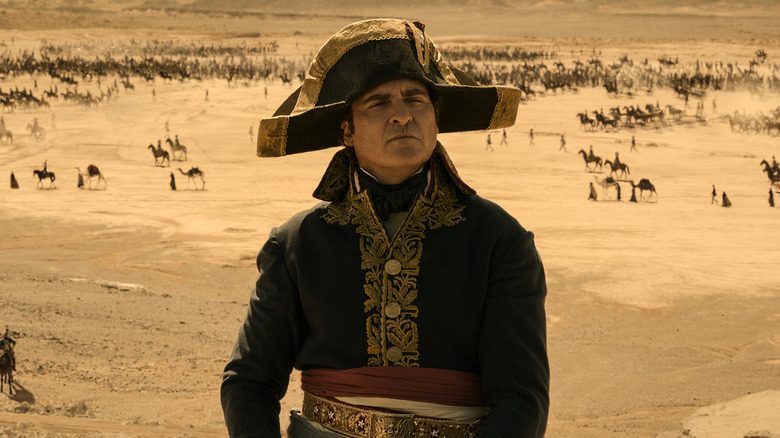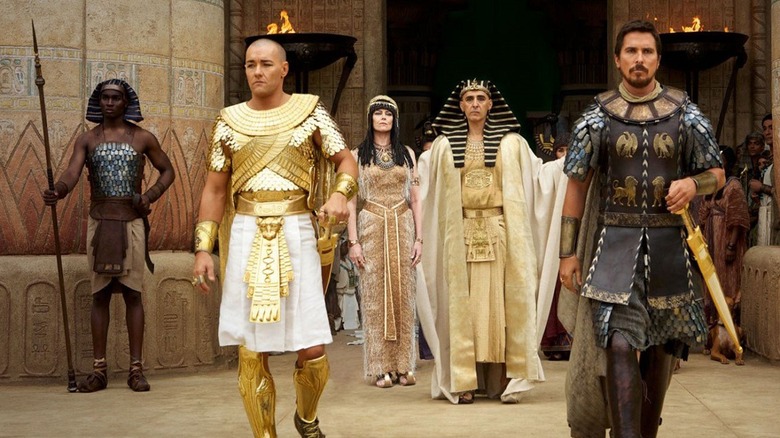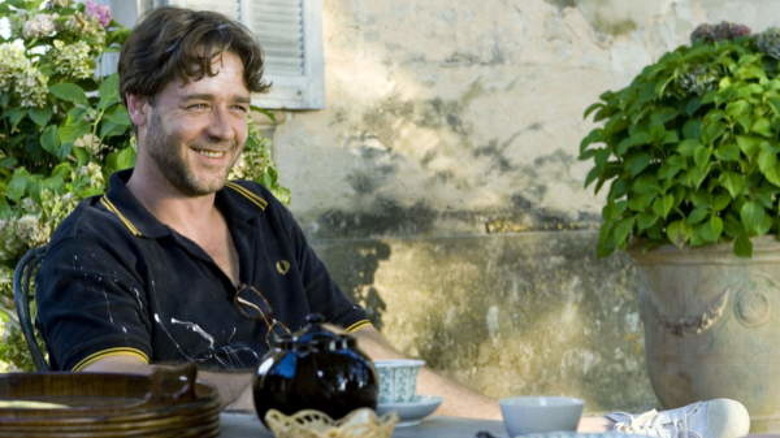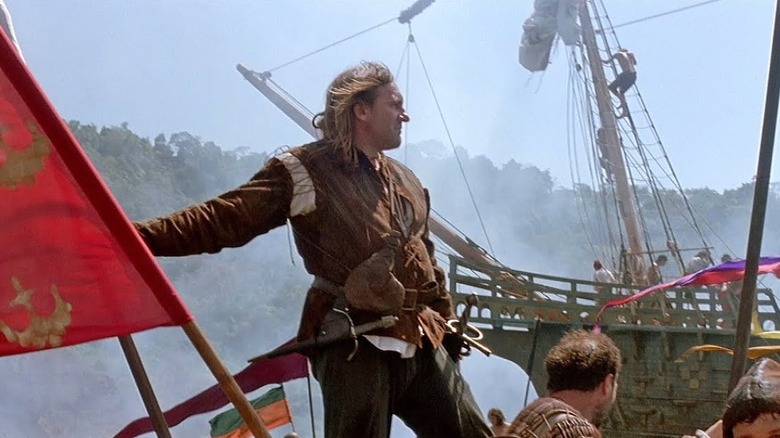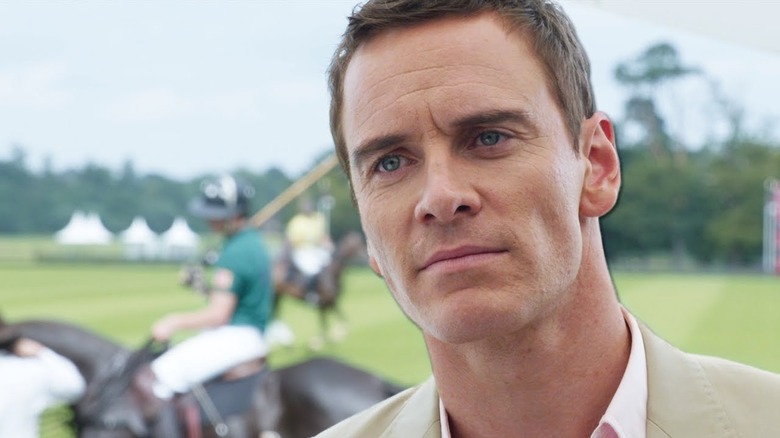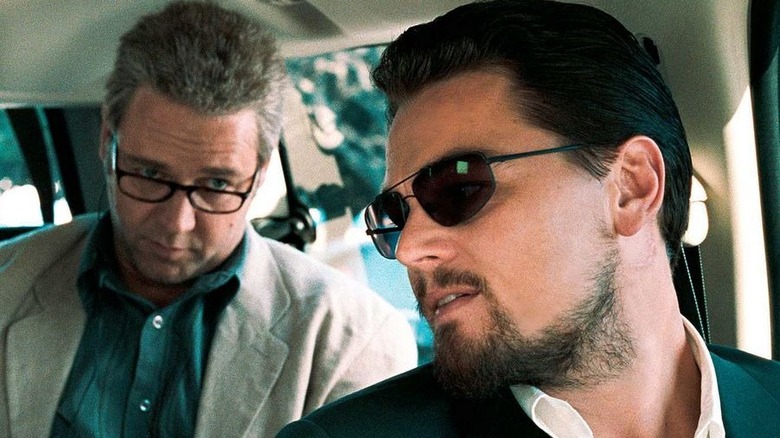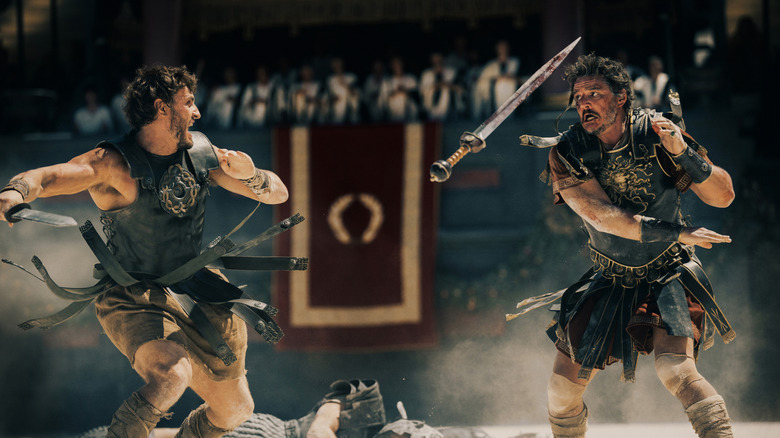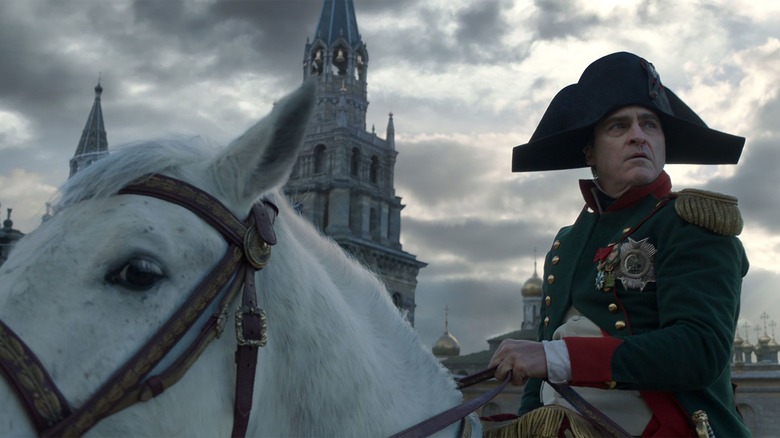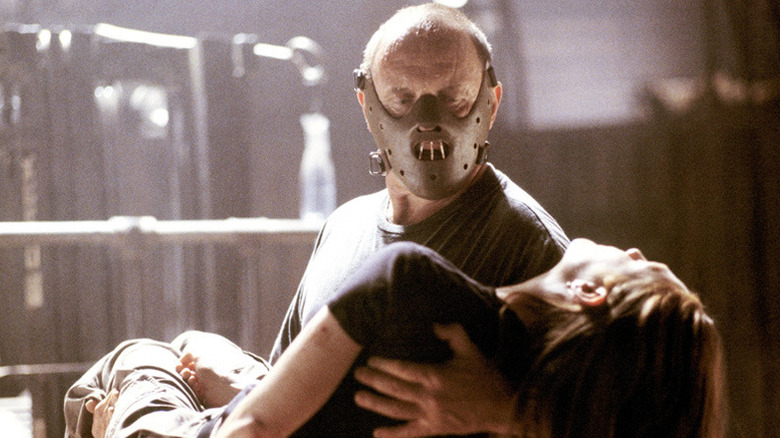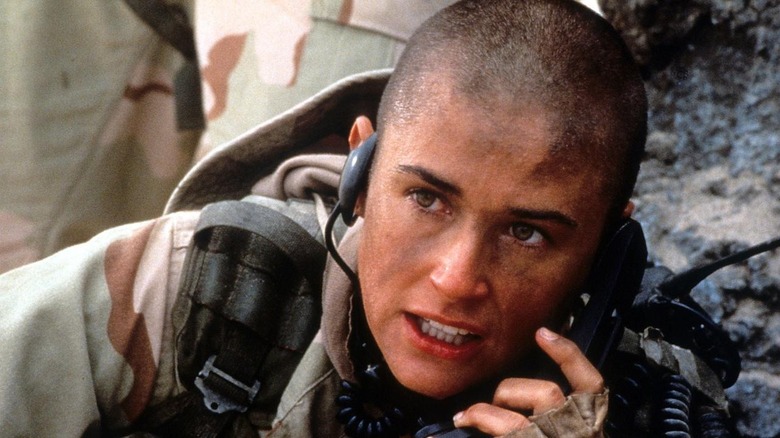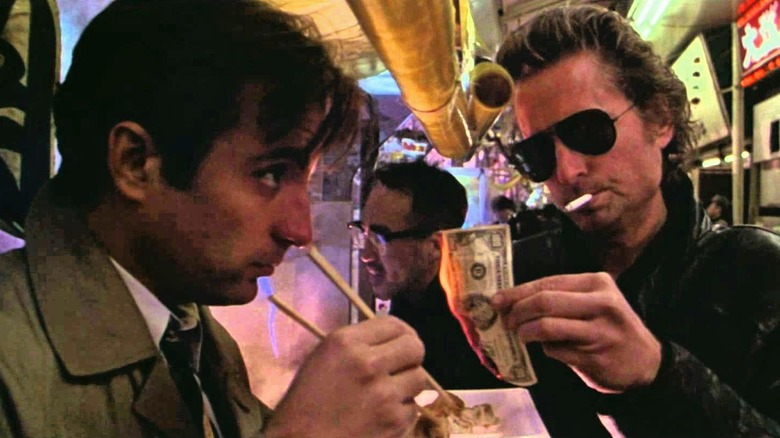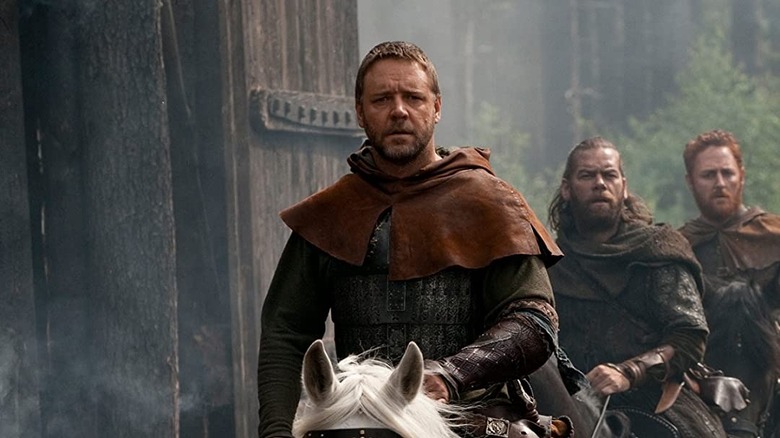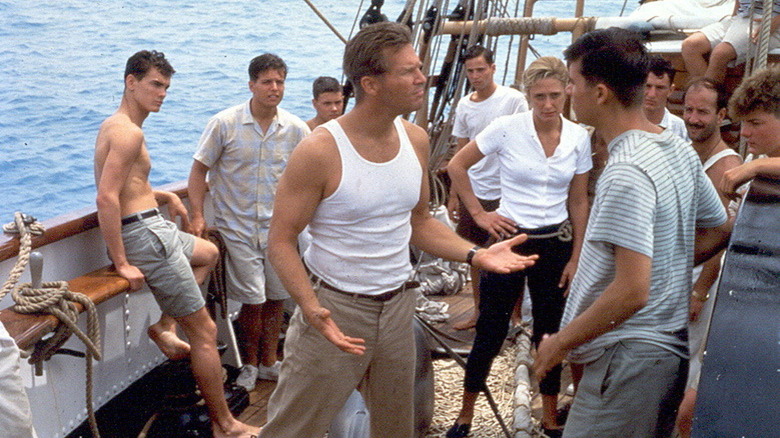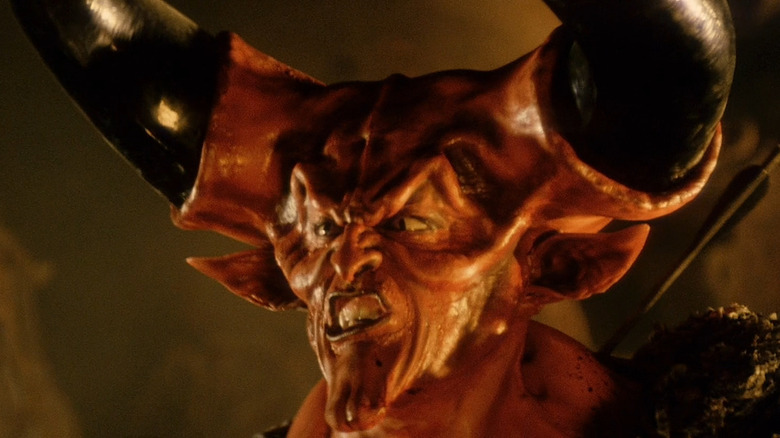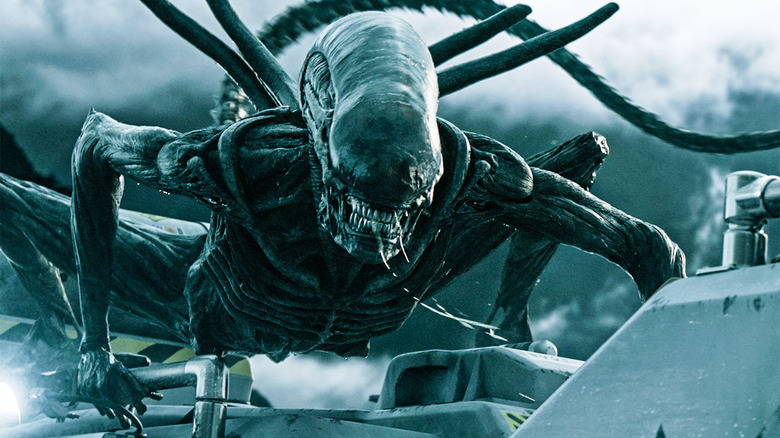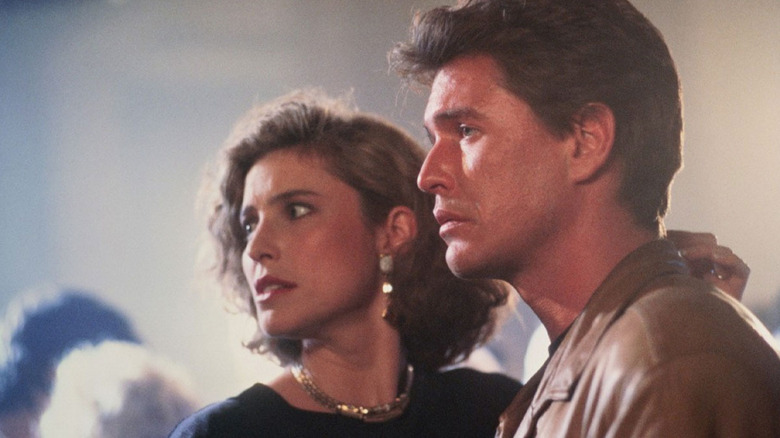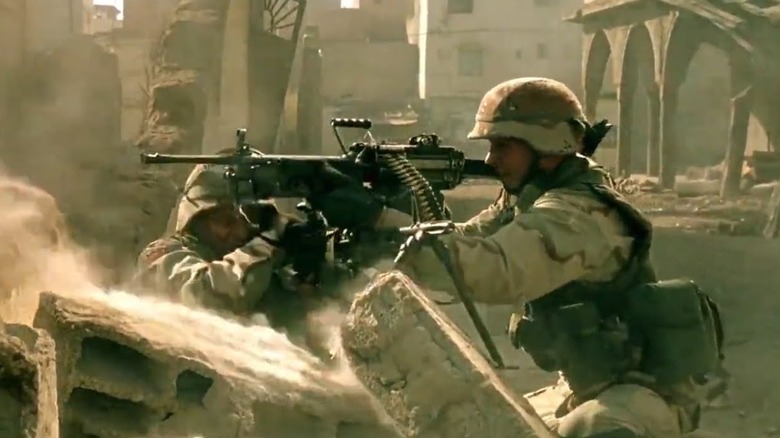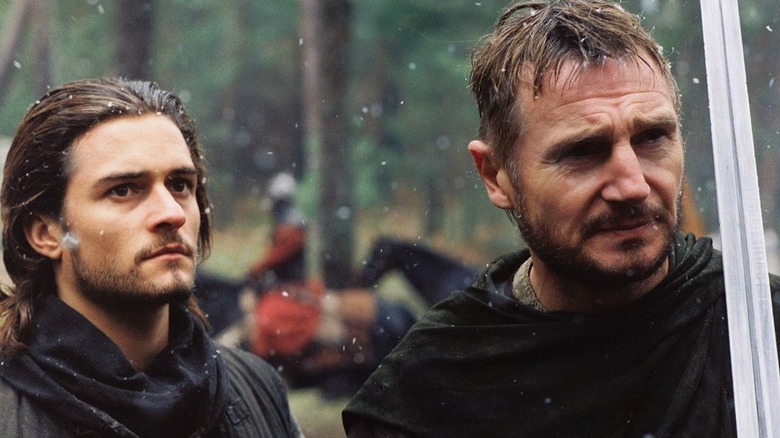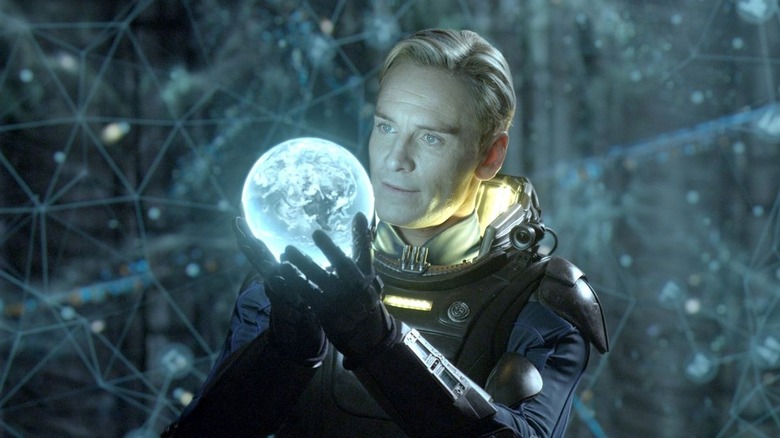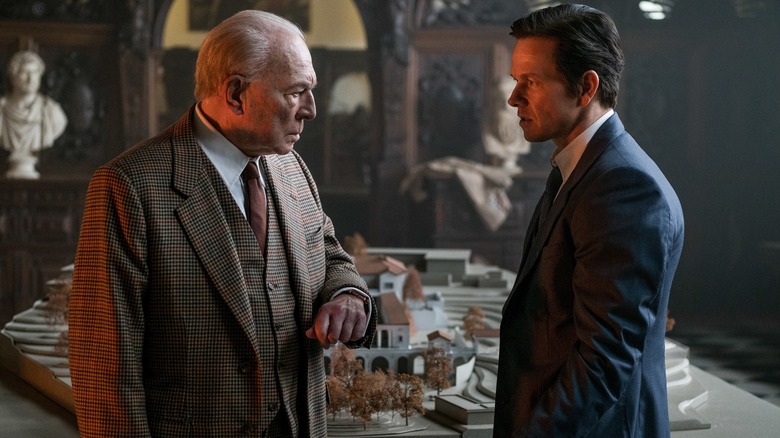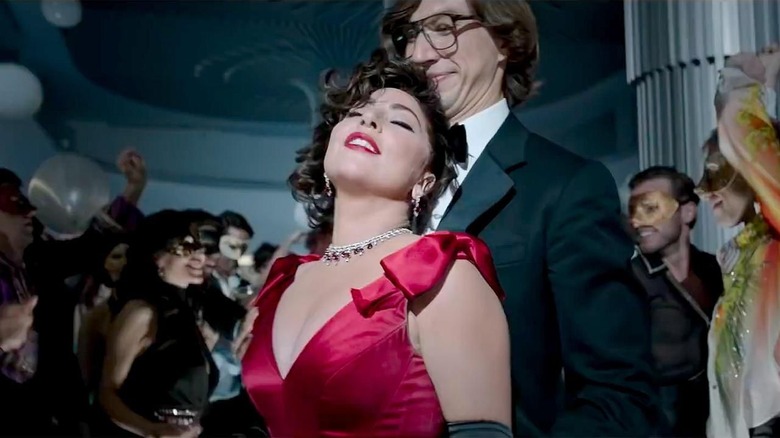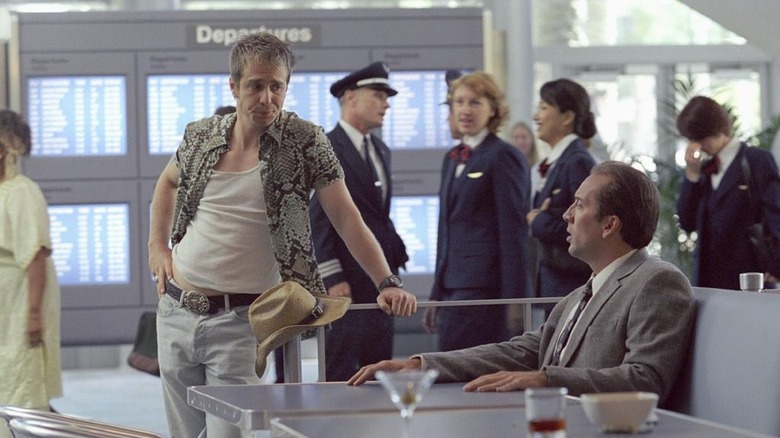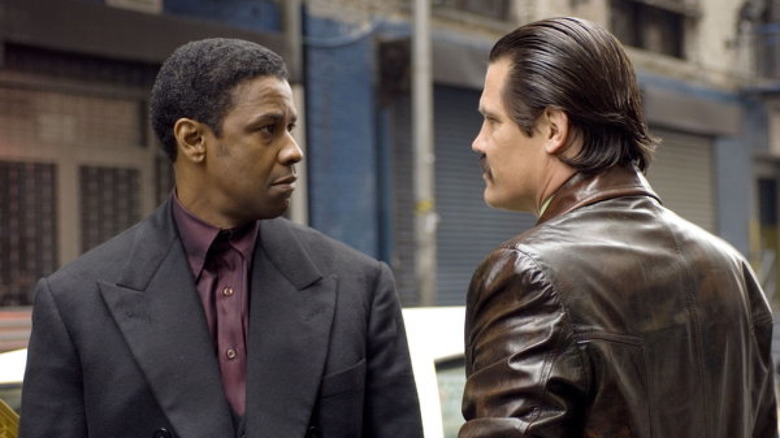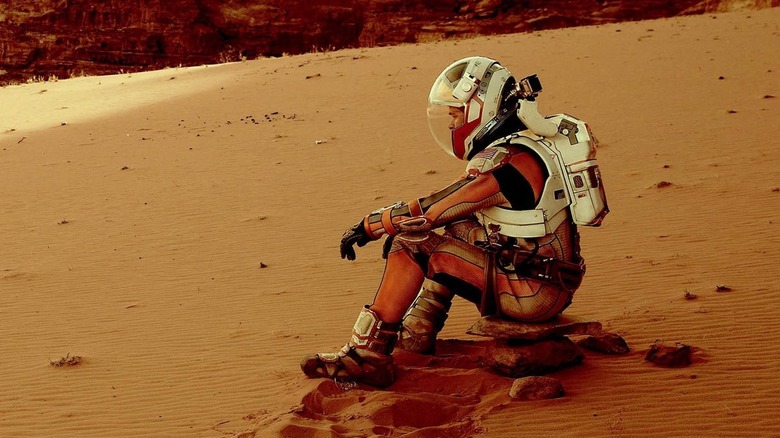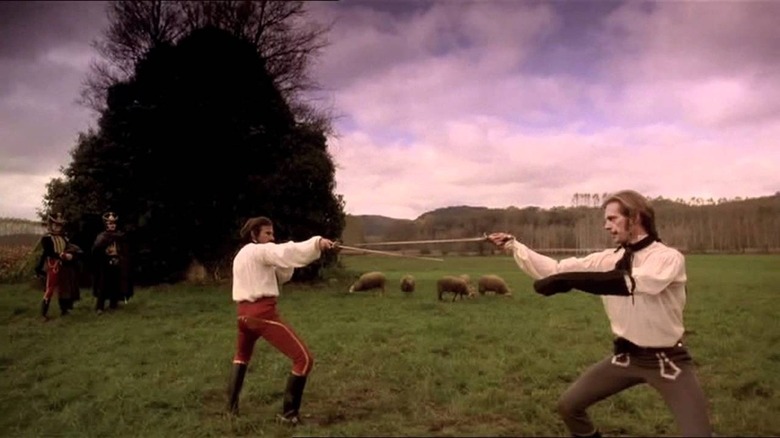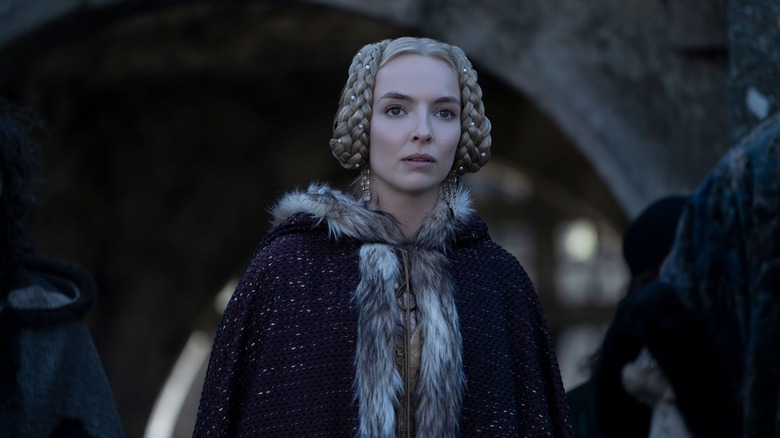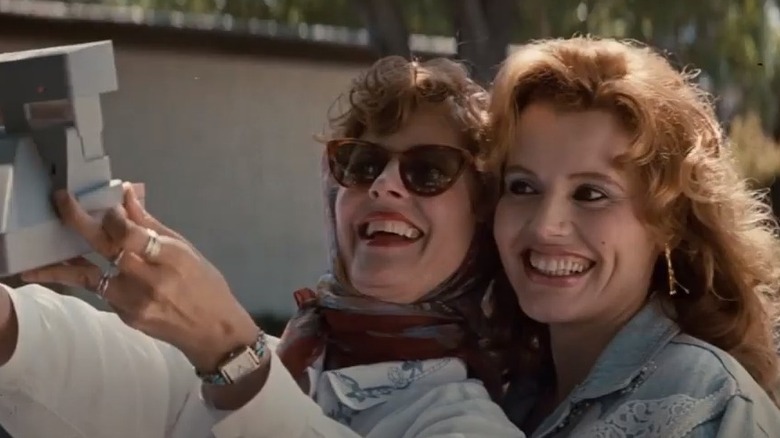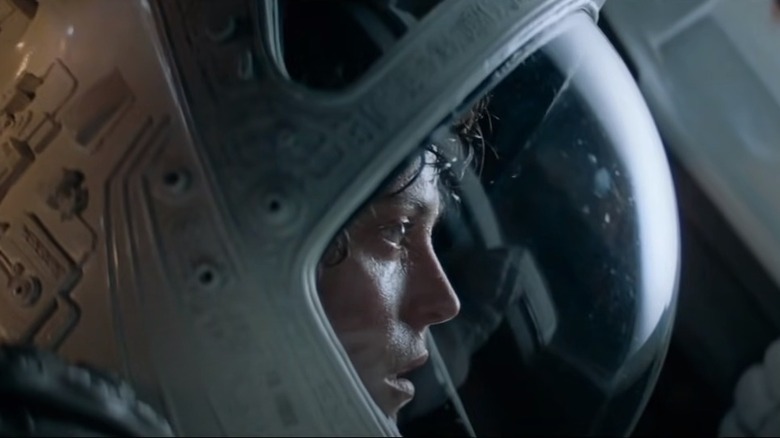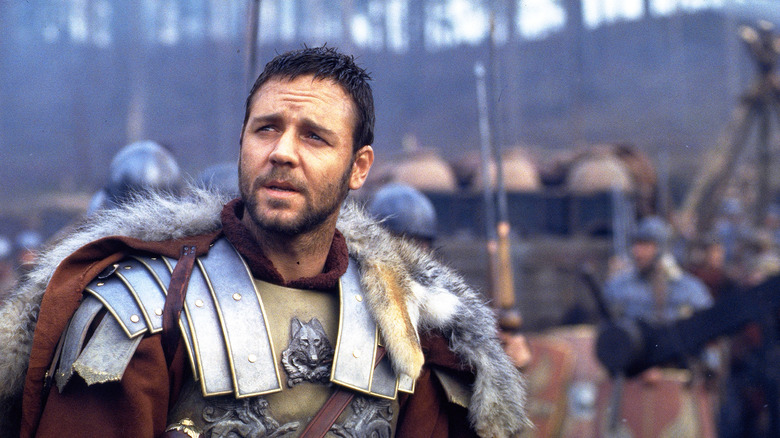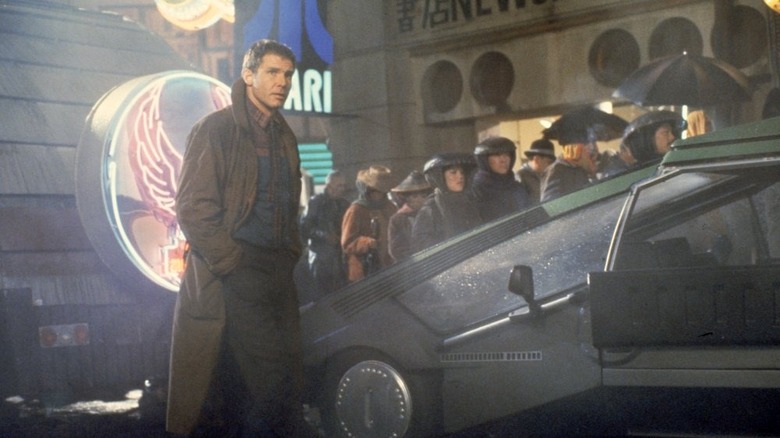Every Ridley Scott Movie Ranked From Worst To Best
Since the late 1970s, Ridley Scott has been a more or less constant figure in cinema. From his early achievements in science fiction to his more recent ventures into epic historical filmmaking, he is a director perpetually on the move, making films at the speed of a man half his age. Despite these accomplishments and the outsized impact he's had on multiple genres, he remains one of the most prominent working filmmakers to have never received a best director award at the Oscars.
That isn't to say that his entire career has gone without a hitch. Indeed, he's faced more than his fair share of box office disappointments. But one of the charms of Ridley Scott is that he always seems to have a reason for why certain films of his weren't financially successful, and it seldom has anything to do with him. Still, he's one of the rare directors with enough talent and clout in Hollywood to back these pronouncements up, and it's difficult to imagine him retiring from directing anytime soon.
29. Exodus: Gods and Kings (2014)
Ridley Scott has a pretty good track record when it comes to filmmaking on an epic scale. Alas, this is not his finest hour. With "Exodus: Gods and Kings," he tells the familiar biblical story of Moses leading the Jewish people out of Egypt. There are two main problems with this: The first misstep is that he cast Christian Bale as Moses and Joel Edgerton as Ramses which, combined with a predominantly white cast, led to the entirely valid criticism that he was making a movie about people of Middle Eastern and North African heritage without casting any actors of the same ethnic background.
Scott defended his decision in an interview with Variety, arguing that the only way this very expensive film could get financed was with big Hollywood actors in the lead roles. Not everyone bought this excuse, and the film was even banned in Egypt. An equally damning issue is that there is nothing in "Exodus: God and Kings" that hadn't been done better by cinematic biblical adaptations that came out a full 60 years earlier.
28. A Good Year (2006)
No one could accuse Ridley Scott of sticking to just one genre, but "A Good Year," a slight, unremarkable romantic comedy, is definitely a little bit out of his wheelhouse. Russell Crowe stars as a workaholic stockbroker who returns to his family vineyard in France upon his uncle's death. There, he meets a young woman who claims to be his uncle's illegitimate daughter — someone who could stand to inherit the entire property.
It's a pretty sappy film about a man learning what really matters in life by immersing himself in the French countryside or basically another entry in the genre that would contain "Under the Tuscan Sun" and "Eat, Pray, Love," only with a man in the lead role and arguably not as good. Realistically, it's hard to see "A Good Year" as anything more than the perfect excuse to film in the South of France for a few months. It's hard to begrudge Ridley Scott that, but scenery alone doesn't make for a particularly good movie.
27. 1492: Conquest of Paradise (1992)
With "1492: Conquest of Paradise," Ridley Scott exhibits his trademark interest in historical epics. The second of such films he directed in his career after his debut with "The Duellists" stars Gerard Depardieu as Christopher Columbus and details his journey to the New World. "1492" marks the first time that Scott would reunite with his "Alien" star Sigourney Weaver. It's just a shame it isn't for a more auspicious occasion.
There are a number of reasons why the film wasn't particularly well-received. It presents a borderline irresponsibly idealized depiction of Columbus' exploits in the New World, waving to the side his many acts of genocide. This might, however, be a retrospective criticism of the film. At the time, it was probably hurt the most by the fact that Hollywood, keen to capitalize on the 500th anniversary of Columbus' journey to America in 1992, had already produced a film about the notorious explorer, "Christopher Columbus: The Discovery." Of course, if you ask Scott, he would blame its failure on the inability of Americans to understand European accents. Whatever the reason, "1492: Conquest of Paradise" was a box office disappointment in the United States, although it did fare marginally better in Europe.
26. The Counselor (2013)
Conventional wisdom says that "The Counselor" is one of Ridley Scott's weaker endeavors. In this crime thriller set amidst the endlessly corrupt Mexican drug trade, Michael Fassbender stars as a powerful lawyer who gets caught up in a drug deal gone wrong in Ciudad Juarez, Mexico. Despite its impressive cast of talented actors, "The Counselor" was a non-starter at the box office with many critics arguing that it has a dull narrative that fails to utilize either its premise or its stars properly.
Still, in the years since it came out, it has developed a small but passionate army of defenders who will argue the film's merits including such illustrious company as Guillermo del Toro who spoke favorably of it in an interview with Variety. Every few years, there's a new film that gets a massive critical reappraisal, and it's certainly possible that such a fate could be in store for "The Counselor." As it stands now, however, it must unfortunately languish near the bottom of Scott's filmography.
25. Body of Lies (2008)
With "Body of Lies," Ridley Scott leans into a good old-fashioned spy thriller, tackling one of his favorite topics: the disconnect between the West and the Arab world. Here, CIA operatives and Jordanian intelligence officers join forces in an attempt to capture a terrorist, but their techniques and ways of approaching the mission vary so significantly as to provide a source of great conflict between the two groups.
"Body of Lies" stars Leonardo DiCaprio, Russell Crowe (in his third film with Scott in as many years), and Mark Strong who all put in strong performances, but they're left to do too much heavy-lifting in getting "Body of Lies" across the finish line. It is perhaps too adherent to the tropes of the spy genre, creating a film that is competent and professionally made but with little of anything resembling a wow factor. Scott's skill is undeniable, but "Body of Lies" is just mediocre.
24. Gladiator II (2024)
There's a version of "Gladiator II," with a script written by none other than Nick Cave, called "Gladiator 2: Christ Killer," in which Russell Crowe's Maximus is brought back from the dead by the Roman gods and given a mission to travel through time and kill Jesus Christ. Sadly, this version never even got close to being made. Instead, we got the most boring take on a "Gladiator II" sequel imaginable.
Scott's 2024 follow-up is essentially a complete retread of the plot of the first movie, only changing things up in the third act. A miscast Paul Mescal is given little to work with as new protagonist Lucius, who appeared as a child in the first movie and through the power of retconning is now Maximus's biological son. The movie takes Lucius through familiar plot beats: the murder (well, death in the heat of battle) of his wife, being captured as a slave, being forced to fight in the arena, catching the attention of a wealthy businessman who was once a slave himself, demanding vengeance on his wife's killer-by-proxy, gaining popularity in the Colosseum etc. We've seen it all before, and it was done a lot better the first time around.
The one saving grace of "Gladiator II" is Denzel Washington, who plays Lucius's new master, Macrinus: a scheming businessman with designs on becoming the next emperor of Rome. Washington goes all-in on the role, delivering a performance so full of gleeful mischief and irresistible charm that Macrinus more or less carries the movie on his shoulders. (Hannah Shaw-Williams)
23. Napoleon (2023)
As you'd expect, Ridley Scott's take on the infamous French emperor/dictator Napoleon Bonaparte is one handsome production. Staged with a scale and a visual panache that would make other filmmakers stare and weep, "Napoleon" is evidence that Scott hasn't lost a step halfway through his 80s. Few filmmakers operate so well on a large scale, and fewer filmmakers make it seem effortless.
Well, effortless on a technical scale. The problem with "Napoleon" isn't the quality of the filmmaking (it's as precise and gorgeous as anything Scott has made), but rather with the storytelling. The theatrical cut of the film runs two and a half hours, but it feels like it's in rush. Characters are barely developed, major events are given short shrift, and the viewer can feel the major gaps plugged up by ham-handed voice over. At the time that this is being written, the four-hour directors cut has yet to begin streaming, but one wonders if this will save the film. Like with "Kingdom of Heaven" before it, it's clear that Scott was under some degree of studio pressure to release a film of reasonable length into theaters. The longer cut of "Kingdom of Heaven" transformed a debacle into a masterpiece. We can hope for the same with "Napoleon."
For now, we can only enjoy the film as a piece of Swiss cheese. And perhaps we can admire Joaquin Phoenix's utterly bizarre performance as the title character, which is more Monty Python than historically accurate. The jury is still out on whether or not there's a secret masterpiece lurking in here. (Jacob Hall)
22. Hannibal (2001)
Following up "Silence of the Lambs," one of the most acclaimed psychological horror films of all time, was never going to be an easy task. In 2001, Ridley Scott released the sequel "Hannibal" which takes place a decade after the events of the original film. Anthony Hopkins reprises his iconic role as famed serial killer Hannibal "The Cannibal" Lector with Julianne Moore replacing Jodie Foster as FBI special agent Clarice Starling
Ridley Scott is a perfectly capable director, but the film suffers for the absence of Jonathan Demme, the director of "Silence of the Lambs," who seemed to understand like no one else author Thomas Harris' particular brand of unsettling horror. Although Demme was originally slated to direct, he declined to come back, allegedly claiming that he found the new text too lurid (which, after the events of the original film, is saying quite a lot). The overwhelming consensus is that "Hannibal" fails to capture the vulgar magic of the first film. Still, it is difficult to fault the lead performances of Hopkins and Moore.
21. GI Jane (1997)
"G.I. Jane" is the story of the first woman to undergo Navy SEAL special operations training, but when it came out, 99.9% of the attention was just on the fact that the lead actress Demi Moore got ridiculously ripped for the film. "G.I. Jane" is one of Ridley Scott's more intimate war dramas. It doesn't feature the painstakingly orchestrated combat sequences that would define films like "Gladiator" or "Black Hawk Down."
Although Demi Moore clearly put everything she had into the performance (in her memoir "Inside Out," she refers to it as her proudest professional achievement), the critics were not kind to "G.I. Jane." Moore's acting in the film most frequently came under fire, and the failure of the film to make back its budget could potentially be tied to a perceived decline in her popularity as an actress. Yet, Moore is not entirely to blame for the film's failure. It is, in many respects, simply a dull and cliché-ridden production that would have struggled to succeed regardless of the person in the lead role.
20. Black Rain (1989)
Every once in a while, Ridley Scott takes a shot at a contemporary action thriller, and he often ends up churning out a good product like "Black Rain." Michael Douglas and Andy Garcia star as a pair of NYPD officers who arrest a member of the Yakuza and have to escort him back to Japan where, predictably, things don't go exactly as planned.
"Black Rain" was well-received when it came out with a box office take of $134 million and two technical Academy Award nominations for best sound and best sound editing, but it has become even more popular in the years since its initial release. Filmed primarily in Osaka, Japan, it seems as though both audiences and critics alike were willing to go along for the ride. A contemporaneous review from Variety states, "Since this is a Ridley Scott film, 'Black Rain' is about 90% atmosphere and 10% story. But what atmosphere!" It's hard to sum up "Black Rain" any better than that.
19. Robin Hood (2010)
On some levels, it sort of feels like "Robin Hood" gets a tougher rap than it deserves. Looking back, it's not an absolutely terrible movie — it's just not particularly inspired. Ridley Scott once more teams up with Russell Crowe, bringing to life the classic English legend of Robin Hood, a medieval vigilante who famously robs from the rich to give to the poor. Released in 2010, this "Robin Hood" falls prey to the especially pernicious trend of filmmakers needing to make a gritty remake of everything.
The action sequences are good, and there's nothing wrong with Russell Crowe's sullen interpretation of the character, but it's hard to escape the overwhelming feeling of gloom that results when a film is as dark and drab as this one. It's visually unexciting and doesn't bring enough to the table in terms of reinventing the narrative to make up for it. Although "Robin Hood" ended up making $321.7 million at the box office, considering how expensive this film was to make, its numbers are less than stellar.
18. White Squall (1996)
To date, "White Squall" is the only time that Ridley Scott has tried his hand at a disaster film. When a group of high school and college students sign up to train on a ship, their journey quickly becomes a perilous one as they face a violent and destructive storm at sea. The story is based on the brigantine Albatross which sank in 1961 as a result of a white squall, a dangerous windstorm that seemingly comes out of nowhere without the presence of black storm clouds.
Jeff Bridges stars as the ship's captain, and he is joined by a promising cast of young actors, many of whom were at or approaching the peak of their teenage fame including Ryan Philippe, Jeremy Sisto, Ethan Embry, and Scott Wolf. It was a box office disappointment at the time, and "White Squall" has the unfortunate distinction of having been co-opted by the QAnon movement for the tagline in its trailer that they consider an expression of solidarity.
17. Legend (1985)
Following on the heels of a 1980s mini-boom of fantasy films that would include "The Neverending Story," "The Dark Crystal," and "Ladyhawke," "Legend" feels more than a little bit aimless. A young Tom Cruise stars as Jack O' the Green who must stop the Lord of Darkness (Tim Curry, who else?) from killing the last of the unicorns and destroying the world.
At the time it was released, "Legend" suffered by coming across as a pale imitation of a number of other fantasy adventures and received mixed reviews. Nevertheless, it was generally praised for its visual effects and makeup. Indeed, its sole Academy Award nomination came in the category of best makeup. In the years since, however, it has become more appreciated. And like many of Ridley Scott's other films, the legacy of "Legend" has been improved immeasurably by the release of an unrated director's cut which showcases more of his original vision for the production.
16. Alien: Covenant (2017)
"Alien: Covenant" is the sequel to "Prometheus," and represents the only time in Ridley Scott's career that he would revisit his own work directly. While both are connected to the original "Alien" film and its sequels, these two movies share a much more intertwined narrative that bears little relation to their distant predecessors. "Alien: Covenant" takes place 11 years after the mission of the spaceship Prometheus with the Covenant following in its footsteps and making many of the same mistakes. For the most part, it was well-received by critics but didn't perform particularly well at the box office.
Released in 2017, it had the misfortune of going up against another follow-up to one of Scott's early masterworks. "Blade Runner 2049" by director Denis Villeneuve came out just a few months later and was the more successful film. It's possible that audiences were overloaded with Scott's science fiction, but it's also likely that "Alien: Covenant" simply paled in comparison to the long-awaited "Blade Runner" sequel.
15. Someone to Watch Over Me (1987)
In many ways, "Someone to Watch Over Me" is one of Ridley Scott's most conventional films. It adheres to the tropes of the crime thriller genre with an almost slavish devotion. Mimi Rogers stars as a socialite who witnesses a murder, and Tom Berenger plays the NYPD detective who must protect her until she can testify in court. Inevitably, the two fall in love despite each being in a relationship with someone else.
The film feels like a throwback to noir thrillers of the past, featuring all the clichés that one might expect right down to the hardboiled detective and the dame he has eyes for. Scott's visual flair elevates the simplistic storyline, but it often seems that his efforts are wasted on a narrative that is as derivative as that of "Someone to Watch over Me." The film received a limited release, and inevitably failed to set the box office alight.
14. Black Hawk Down (2001)
It's almost shocking to remember that "Black Hawk Down," a celebration of American military activity overseas, came out just a few short months after the terrorist attacks on September 11th, 2001. And yet it is entirely fitting that such a jingoistic and overwhelmingly patriotic film would have found a passionate audience in its traumatic aftermath. "Black Hawk Down" revolves around a U.S. military raid in Mogadishu, Somalia, where an attempt to take out a local warlord goes badly awry.
The action is well-executed, and the film features performances from an engaging young cast (Orlando Bloom, Ewan McGregor, Eric Bana, Josh Hartnett, and Tom Hardy are all members of the outfit), even if some of the stirring militarism is a bit over the top. On the other hand, there's room for criticism over the questionable depiction of Somalis in the film and the fact that there were no Somali actors brought on for the production. Nevertheless, it won two Academy Awards for best film editing and best sound with Ridley Scott also receiving a best director nomination.
13. Kingdom of Heaven (2005)
One of the themes that Ridley Scott frequently seems to revisit in his films is the uneasy tension between the Western and Arabic worlds. "Kingdom of Heaven" is a historical epic set in the 12th century amidst the Crusades when religious warriors from Christian Europe fought to reclaim the holy land of Jerusalem from the hands of Saladin. In it, Orlando Bloom plays a French blacksmith who fights against Saladin in the Battle of Hattin. Although the original release of the film was not especially well-regarded, the director's cut has received acclaim.
When the film first came out in 2005, there were worries that the depiction of a holy war could inflame already fraught tensions with the Islamic world and serve as inspiration for extremists. Interestingly enough, "Kingdom of Heaven" was a bigger success in Arabic-speaking countries than it was in the United States. Once again eager to find someone to blame for his film's lack of box office success, Scott suggested in an interview with The Guardian that there was a marketing failure that resulted in "Kingdom of Heaven" being depicted as a romantic adventure rather than a philosophical exploration of religious conflict.
12. Prometheus (2012)
Although Ridley Scott left the "Alien" franchise he created to the capable hands of James Cameron, he would return to the fold in 2012 with "Prometheus," a prequel to his science-fiction classic which operates within the same universe but otherwise has little in common with the characters and events of the original films. Set many years before "Alien," it follows the crew of the spaceship Prometheus as they seek the origins of humanity across the stars and end up discovering a dangerous threat on a distant world.
"Prometheus" stars Noomi Rapace, Michael Fassbender, and Charlize Theron as the key members of the ship's crew. In addition to being a return to the "Alien" franchise, the film also represents a return of Ridley Scott to many of the themes that he addressed early on in his career including the uneasy line between humanity and artificial intelligence. "Prometheus" made just over $400 million at the box office and was nominated for an Academy Award for best visual effects.
11. All the Money in the World (2017)
Poor, poor "All the Money in the World." You have a perfectly good story about the famous kidnapping of the heir to the Getty oil fortune, John Paul Getty III, and a great cast that includes Michelle Williams, Romain Duris, and Charlie Plummer. The only problem? You also have Kevin Spacey in a prominent supporting role — a fact that will send the production into chaos when, two months before the planned premiere of the film, he faces numerous sexual assault allegations.
However credit goes to Ridley Scott, who did the right thing and removed Kevin Spacey from his film. In a mammoth effort, the 80-year-old director reshot all of Kevin Spacey's scenes with Christopher Plummer in just eight days and only a month before the film as scheduled to hit theaters. That this movie even came out is a modern miracle. Yet, all anyone can talk about is Kevin Spacey's removal from it. That's not quite fair because "All the Money in the World" is genuinely a pretty solid film.
10. House of Gucci (2021)
You have to admire Ridley Scott's ability to swing for the fences and go completely over the top. "House of Gucci" is one of his most recent outlandish creations. The story of scandal and high fashion stars Lady Gaga as Patrizia Reggiani who conspires to have her husband Maurizio (Adam Driver), head of the Gucci family empire, assassinated. It's messy and chaotic but also one of Scott's more enjoyable films — even if it does seem like he did his research on Italian culture by playing Super Mario Brothers while mainlining parmesan cheese.
It's difficult to say who goes harder in "House of Gucci," Lady Gaga in the wildly unstable lead role or Jared Leto as the misfit cousin Paolo Gucci. At any rate, part of the film's charm is that no one in it seems to be acting in the same movie, let alone the same scenes. Adam Driver is served well by his understated approach to Maurizio, but at the same time, you can't really begrudge Gaga or Leto their anarchic approach.
9. Matchstick Men (2003)
Just on the face of it, there is nothing to dislike about a film that stars Nicolas Cage and Sam Rockwell as a pair of con men. That's what we get in "Matchstick Men." It's a bit of a departure for Ridley Scott who doesn't have a ton of experience with comedy in his filmography, but the dark sense of humor that this film features seems to fit right in with his style.
These con men work together until one day a young girl (Alison Lohman) shows up claiming to be the daughter of Nicolas Cage's character. "Matchstick Men" playfully maneuvers around with characters crossing, double-crossing, and possibly even triple-crossing one another with reckless abandon. It's a lightweight production but more clever than it seems, and it's a tremendous amount of fun. Cage and Rockwell are particularly well-suited for their roles, and all of the performances are beyond reproach.
8. American Gangster (2007)
With "American Gangster," Ridley Scott tries his hand at a traditional crime biopic starring Denzel Washington and Russell Crowe. Washington plays Frank Lucas, a gangster in Harlem who was famous for smuggling massive amounts of heroin into the United States during the Vietnam War. This film details not just his criminal exploits but also the investigation into his activities by Federal Bureau of Narcotics task force head Richie Roberts (Crowe). "American Gangster" was a tremendous box office success, earning $269.8 million worldwide.
Although it can be a little slow in places, more than anything else, "American Gangster" feels like a charming throwback to crime films from the late 1960s and 1970s — the heyday of the cinematic antihero. Washington in particular brings a seductive charisma to his performance, drawing the audience in against their will and making them almost root for Lucas. "American Gangster" received two Academy Award nominations including best supporting actress for Ruby Dee and best art direction.
7. The Martian (2015)
"The Martian" finds Ridley Scott in familiar territory, once again involved in a science fiction film set in space. But compared to some of his other movies which are fraught with peril, "The Martian" is refreshingly light-hearted even in its moments of danger as the lead character fights for survival. Based on the novel by Andy Weir, Matt Damon stars as a botanist-turned-astronaut stranded on Mars who must fight to stay alive until his colleagues back on Earth can mount a rescue mission.
Ridley Scott's vision combined with Matt Damon's winning lead performance made "The Martian" a massively popular blockbuster, ultimately becoming the ninth highest-grossing film of 2015. It received seven Oscar nominations including nods for best actor, best picture, and best adapted screenplay. Sadly, the film went home empty-handed, but Scott and Damon must have taken solace in the fact that their film was so famous that a newly discovered Australian bush tomato was named after the lead character of Mark Watney.
6. The Duellists (1977)
The very first film in his now over 40-year career as a director, "The Duellists" was released in 1977 and went a long way towards putting Ridley Scott on the map. Based on a Joseph Conrad short story called "The Duel," "The Duellists" is a historical picture set in 1800s France revolving around the lifelong grudge between two soldiers (played by Keith Carradine and Harvey Keitel) serving under Napoleon who fight over 30 duels before finally tiring and leaving one another alone for good.
It won the prestigious best debut film award at the Cannes Film Festival and announced Scott's presence on the global stage. In many ways, it feels like a companion piece to Stanley Kubrick's "Barry Lyndon" which speaks to its quality. Film critic Pauline Kael wrote in her review of the film, "We sit back and observe it, and it's consistently entertaining — and eerily beautiful. You watch almost unblinking, because the imagery is so lustrous."
5. The Last Duel (2021)
Ridley Scott is wrong to blame millennials for the failure of "The Last Duel." However, he should be blaming someone because it is legitimately one of his best films, and it deserves so much better than the lukewarm and often borderline hostile reception it received. In a "Rashomon" style narrative, "The Last Duel" tells the story of the final royally sanctioned duel to take place in France which was fought to determine the authenticity of a sexual assault claim made by a French gentlewoman named Marguerite de Carrouges (Jodie Comer).
We see the events first from the perspective of her stubborn, rash husband Jean (Matt Damon), then as witnessed by her alleged rapist Jacques Le Gris (Adam Driver), and finally we hear the truth from Marguerite herself. The subtle variations between these interlocking narratives do much to explore the injustices of man's perception of woman, and Jodie Comer's expressive face makes obvious what the men in her life choose to ignore. It's a smart, nuanced piece that has been done a great disservice by being written off as merely a story about sexual assault.
4. Thelma & Louise (1991)
One of the most feminist films in Ridley Scott's filmography (and in cinema at large), "Thelma & Louse" would serve as a shining example of how to tell a story about women with agency. It stars Susan Sarandon and Geena Davis as a pair of friends who, fed up with their lives, embark on a road trip that quickly devolves into a criminal misadventure. Although it faced accusations of misandry from some critics at the time, it struck a chord with female audiences and became one of Scott's biggest hits of the 1990s.
Both Sarandon and Davis received lead actress Academy Award nominations, Ridley Scott was honored with his first nomination for best director, and screenwriter Callie Khouri took home an Oscar for her work on the film. "Thelma & Louise" is best remembered for its iconic closing sequence which features Davis and Sarandon on the precipice of a cliff before deciding to defiantly take their car over the edge. Equally memorable is Brad Pitt's star-making turn earlier in the film.
3. Alien (1979)
"In space, no one can hear you scream." As great as that tagline is, "Alien" is even better. A slow burn of a science fiction-horror hybrid, "Alien" is tantalizingly tense as we follow the misadventures of a space crew facing off against an alien threat that is terrifying in its invasiveness. Setting aside the iconic chestburster scene, the entire film grapples with a depiction of body horror that revolves around an unsettling sense of physical violation.
The genre-defining film would go on to have a massive legacy, first winning an Academy Award for best visual effects and then spawning a wider franchise of films, books, and video games. Sigourney Weaver as Ellen Ripley creates one of the best female characters in science fiction cinema — all the more impressive considering that this is only her first major film role. Ridley Scott would hand the reins over to James Cameron, David Fincher, and Jean-Paul Jeunet for three sequels before returning to the franchise in 2012 with "Prometheus."
2. Gladiator (2000)
Throughout the late 1980s and 1990s, much of Ridley Scott's work was unable to find an audience like his early crowd-pleasers did. It wasn't until 2000 that he managed to produce a massive success in the form of the epic historical drama "Gladiator." Russell Crowe stars as Maximus, a Roman general who is betrayed by his emperor (Joaquin Phoenix in a deliciously villainous role) and forced into slavery as a gladiator.
It was a resounding hit at the box office, eventually becoming the second highest-grossing film of 2000. Although there were mild criticisms that it played fast and loose with history, it did well at the Academy Awards, winning five Oscars including best picture and best actor for Crowe. "Gladiator" would almost single-handedly reinvigorate the sword-and-sandal genre that had been dormant for decades and created a renewed popular interest in classical history that is now referred to as "the Gladiator effect."
1. Blade Runner (1982)
"Blade Runner" isn't just Ridley Scott's greatest film, it's one of the best science fiction pictures ever made. Based on the novel "Do Androids Dream of Electric Sleep?," it stars Harrison Ford as Rick Deckard who has been assigned to hunt down four errant replicants before they're able to do too much damage on Earth. The stylized urban landscape featured in "Blade Runner" is astounding, evoking memories of Fritz Lang's 1927 classic "Metropolis" while also creating a unique depiction of a hyper-commercialized city left in ruin.
"Blade Runner" was nominated for best art direction and best visual effects at the 1983 Oscars. "Blade Runner" is probably one of the most recut films of all time. Over the decades since its initial release, we've been treated to the original cut, the international cut, the director's cut, and the final cut. Each has their own defenders and detractors, but the one thing that shines in each of the versions is the incomparable "Tears in Rain" monologue from Rutger Hauer which reminds us what it means to be human.
